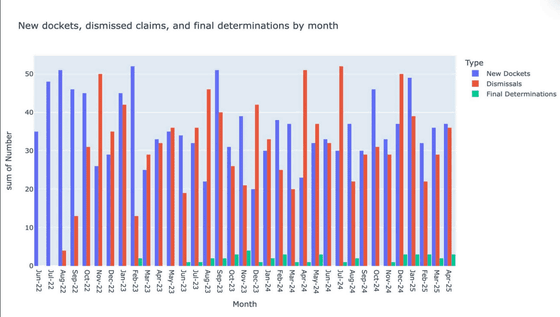The Copyright Claims Board, which was meant to help resolve copyright disputes, is 'ineffective and a waste of taxpayer money,' watchdog group says

Copyright Claims Board is “Ineffective and Costly,” Watchdog Groups Say * TorrentFreak
https://torrentfreak.com/copyright-claims-board-is-ineffective-and-costly-watchdog-groups-say/

Established under the Copyright Alternative Dispute Resolution Act (CASE Act) , the CCB provides a forum for claims of copyright infringement and false claims regarding copyright registrations, mainly online, without the need for a lawyer, with damages of up to $30,000 (approximately 4.3 million yen). At the time of its establishment, many rights holders and related organizations supported the CCB, saying that it would allow them to resolve copyright disputes without filing expensive federal lawsuits, but there were also voices of opposition, stating that it could be abused by 'threatened claimants such as trolls.'
Now that the CCB is about three years old, the U.S. Copyright Office is currently engaged in a formal review of the CCB to determine its effectiveness, known as the CASE Study . As part of this review, a coalition of watchdog groups, including the American Library Association and Engine , a company that specializes in economic research and policy analysis, have submitted an assessment of the CCB.
According to a report from a coalition of watchdog groups, there were no signs of vandalism such as the initial fears of CCB being abused, but various other flaws were identified.
The first important point is the cost. In the three years since its establishment, more than 1,200 claims have been sent to the CCB, but only 35 have been finalized by the CCB, with an average of about $2,000 in damages awarded. The total amount paid to copyright holders over three years was about $75,000, but the cost of operating the CCB for three years was about $5.4 million, which the coalition of watchdogs pointed out was 'not commensurate with the cost and effectiveness.' Below is a graph showing the CCB's activity from June 2022 to April 2025, with blue representing the number of copyright infringement claims, red representing the number of cases rejected, and green representing the number of cases processed to a final decision.

Because the CCB is funded by taxpayer money, the coalition of watchdog groups wrote in their filing, 'American taxpayers have spent approximately $5,500 per case to dismiss hundreds of frivolous claims, adjudicate the remaining 3.5 percent, and award damages that average less than half the cost of processing the claims.'
Another problem with the CCB is its high denial rate. Of the approximately 1,200 claims filed, 964 were denied, of which 470 were for 'non-compliance,' i.e., failure to follow the claims rules or to amend the claims when requested by the CCB. 187 were denied for failure to provide valid certification, 114 were denied because the claimee opted out (refusal to participate in the process), and 99 were settled without the CCB's involvement. The coalition of watchdogs pointed out the problems with the system, saying, 'The filing fee of $40 is not enough to deter frivolous claims. There are hundreds of non-compliant claims every year, where the claimant disappears after the CCB's in-house lawyers have spent considerable time evaluating the claims and preparing detailed amendment orders.'
In addition, the high rate of default judgments is a concern. 60% of the CCB's final decisions were default judgments in which the respondent was not involved. While the CCB can reduce litigation costs and the hassle of litigation, unlike regular courts, CCB decisions have limited legal binding power, which may mean that sufficient judgments are not being made.
Overall, the coalition of watchdog groups argues that 'until the CCB proves capable of carrying out its original mission, there is no reason to consider expanding the CCB's scope or authority. If current concerns remain or worsen, Congress should consider repealing the CASE Act.'
in Note, Posted by log1e_dh